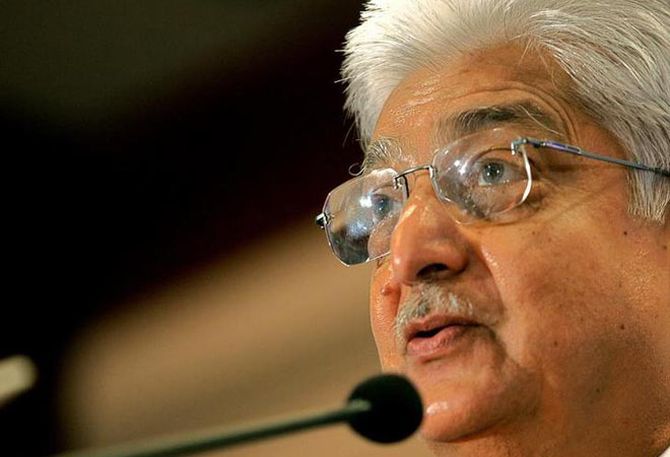People mostly say 'work hard and party harder', but Premji’s concept is ‘work hard and work harder’.
With close to 70 per cent of his wealth pledged to charity, Premji is also the epitome of a true leader who makes a mark in giving back most of his wealth to society.

Three months ago, when a former financial manager of Wipro met founder-chairman Azim Premji in Bengaluru, the first commitment he had to give was to reduce his weight by at least 5 kg.
“One of the first things he told me was - you will come and meet me when you reduce 5 kg,” said A K Sabat, partner at chartered accountancy firm AK Sabat & Co, who worked with Premji in the late 70s during the company’s infancy.
No doubt, Premji - himself around 75 now - has never compromised on his health, nor on any facet of his personality, for which he stood tall among business leaders of his time and even before, he added.
Sabat was among the few executives to have worked with Premji during Wipro’s initial days.
As the chief of accounts and internal audit from 1979-82, the veteran CA has plenty of anecdotes to share.
“When I joined Wipro in 1979, the turnover was just Rs 30 crore and profit had not even reached Rs 1 crore.
"The company had just started getting into vanaspati business.
"But Mr Premji was very optimistic and used to tell me that you will not see such figures a couple of years from now,” recalled Sabat.
The next year (1980), Wipro made a profit of Rs 1.25 crore and Rs 3 crore a year after that.
By the time Sabat decided to leave for independent practice, the profit had jumped to Rs 6 crore.
This was also the time when India’s socio-political environment was going through a transition, with the then-industry minister George Fernandes ordering US corporations like IBM and Coca Cola to leave the country.
As a true business leader, Premji sensed an opportunity with such exits.
He decided to enter the software and computers market, given the void created.
“In 1982, we did the demerger of computers from vanaspati business.
"Mr Premji was of the firm opinion that we need to offer better salaries to computer engineers, compared to staff in (our) vanaspati business.
"We then decided to separate both companies,” said Sabat.
Ashok Narasimhan, the then-CFO and Financial Controller of Wipro, became the first head of Wipro’s computer division - known at the time as Wipro Information Technology Services.
Once apprehensive about decent salary prospects for its newly established computer business unit, Premji scripted history with this new division.
He hired engineers and built his first minicomputer in 1982.
A year later, he released Wipro 456 - a spreadsheet programme similar to Lotus 123, which was a top seller.
Wipro’s first personal computer was launched in 1986, under his leadership.
With liberalisation of the Indian economy in 1991, Wipro’s software was no longer protected from foreign competitors, so he put his programmers to work for the corporations that were streaming back in.
During the Y2K panic of 1999, Wipro rewrote millions of lines of code for large US corporations.
Dozens of other Y2K clients stayed on as Wipro customers, when the crisis passed.
“Whatever Premji does, he does with very thorough and in-depth planning,” said A L Rao, former COO and founder-member of Wipro's technology business, who retired in 2009.
“The beauty of the Premji team is that he ensures everybody is equipped and that they carry his legacy.
"He ensures everybody is brought to their capabilities and groomed well,” said Rao (now 70), who had joined Wipro in 1980 as one of the first six employees of its computer business.
From a senior software engineer to head of R&D, and going on to become CTO and eventually the COO, Rao climbed up the ladder during his almost three-decade stay at Wipro.
“I had my life learning experience under him. Hard work, attention for detail, and absolute integrity are few things for which I will always remember him,” said Rao, who now advises start-ups and is also on the board of a couple of companies.
While Premji's legacy in building up, Wipro is a reflection of his business acumen; his persona itself is an inspiration to many.
“He has many facets from which I have learnt, but the most remarkable is his humility and simplicity, unburdened by his extraordinary stature,” wrote Wipro’s CEO Abidali Neemuchwala, in an internal mail to employees.
With close to 70 per cent of his wealth pledged to charity, Premji is also the epitome of a true leader who makes a mark in giving back most of his wealth to society.
When Premji joined his father’s business after his demise in 1966, one of the investors at Western India Vegetable Products advised Premji to step down, so that more experienced managers could take over.
Premji didn’t heed his advice and stayed on to prove otherwise.
As he decides to retire now, Premji’s second plan seems to unveil in its true earnest.
“People mostly say 'work hard and party harder', but Premji’s concept is ‘work hard and work harder’. That's not just for us but himself, too,” said Suresh Senapathy, former CFO of Wipro, who retired in 2015.
Photograph: Adnan Abidi/Reuters












 © 2025
© 2025